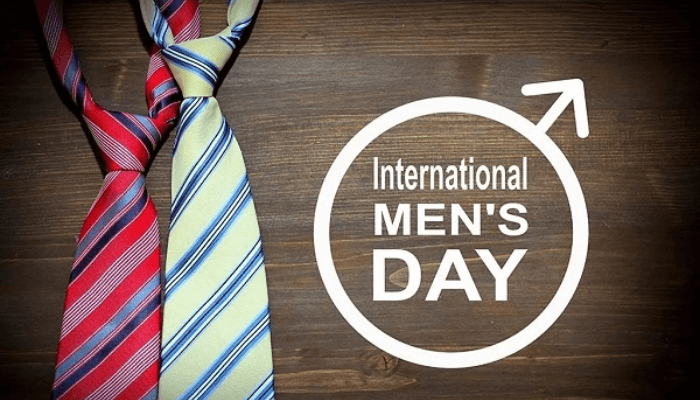On International Men's Day, we honor the contributions of men across generations while confronting the seismic shifts of the digital age. The theme “Startling Beyond Space” reflects a world where boundaries dissolve, speeds accelerate, and flexibility becomes the defining characteristic. Leadership, innovation and people in leadership now stand at a crossroads: called to reimagine the future of work, mentor Gen Z as they enter the workforce in unprecedented numbers, and strengthen national critical infrastructure in the Global South. It is not a celebration of masculinity in isolation, but a celebration of responsibility, foresight and legacy. Today reminds us that men must be builders of resilience, stewards of ethical technology and champions of intergenerational inclusion. Their role is not just to adapt, but to create systems that absorb shocks, nurture talent and secure the foundations of society. The challenge is deep, but so is the opportunity: to shape a future where work is dignified, infrastructure is resilient, and the youngest people inherit a platform of strengths rather than weaknesses.
Digital shock: beyond space, beyond decency
We are living through a trauma that not only shatters timelines; It dissolves boundaries. The digital age has transported us “beyond space” – a reality where boundaries have blurred, velocity rules and flexibility is no longer a luxury but the organizing principle of society. In the Global South, this moment is both dangerous and promising. Either we build agile, values-based systems that can withstand sustained turbulence – or we watch the potential of a generation evaporate in a fog of underemployment, fragile infrastructure and dependence on external capacity. This election is structural, moral and urgent.
Generational Tipping Point and the Redesigned Contract of Work
By 2030, more than one billion Gen Z youth will enter the workforce, a demographic boom that is reshaping work itself. For the first time, five generations co-exist in organizations, making multi-generational collaboration central to innovation and adaptation. Gen Z is not passive; They are driving technology-enabled change and demanding people-centric, purposeful models. His behavior underlines mobility as normal, loyalty as earned and purpose as essential. Surprisingly, 47% of Gen Z employees say they might leave their jobs within six months, yet they are the least confident about finding better roles – an urgent paradox for employers to solve. In response, organizations are investing in better technology tools (76%), workforce wellness (75%), flexible hours (73%), fair compensation (73%) and career development. These statistics reveal a workplace contract under active reconstruction, which must be made relevant to ensure inclusion, resilience and dignity for the Global South.
Three strategic axes for talent: assessment, limitations and AI segmentation
Nations must act boldly to prepare for the future of work. The rise of Gen Z demands a shift from credentials to proven skills, from local hiring to cross-border movement, and from the digital divide to AI literacy with ethical guardrails. These pivots are not cosmetic – they are the cornerstone of inclusion, enabling the Global South to move beyond gatekeeping and strengthen opportunity in capacity. As digital natives reshape economies between 2025 and 2035, there is a growing urgency for systemic change, ethical frameworks and financial resilience that secure both work and fortunes.
Strengthening national critical infrastructure: Resilience as destiny
If the power grid flickers, payments rails fail, or public services crash due to digital pressures, talk of the “future of work” rings hollow. National Critical Infrastructures (NCIs) in the Global South must be strengthened – not only to absorb shocks, but also to serve as platforms for innovation, employment and dignity. This demands a holistic architecture:
Electricity and connectivity as fundamental beliefs
Resilient infrastructure is the lifeblood of the digital age. Nations should stabilize electricity through hybrid grids that mix national systems, microgrids, and renewable clusters, ensuring redundancy for rural and peri-urban communities. At the same time, broadband must expand on a secure, neutral basis that promotes innovation and trade while simultaneously promoting essential services such as health, education, payments and emergency response. Digital exclusion cannot remain a statistic – it is a serious risk that must be addressed if societies are to move forward.
Cybersecurity as a public contract
Critical infrastructure must be protected with resiliency at its core. Zero-trust architectures, modern identity frameworks and strict segmentation are essential to securing operational technology in energy, water, transportation and manufacturing, where repurposed IT logic is dangerously inadequate. Regional intelligence fusion in the Global South could set shared standards, strengthen incident reporting, and promote transparency through safe-harbor norms. At the same time, talent pipelines must be developed with a civic purpose – a National Cyber Security Corps built on apprenticeships, micro-credentials and rotations into utilities and finance – ensuring a generation of professionals prepared to protect and maintain the systems on which society depends.
Financial Rail and Digital Sovereignty
Flexible payments require diverse infrastructure, rigorous settlement and continuity plans with cryptographic assurance as standard. Public digital systems should provide open identities, interoperable data exchange, and ethical AI autonomy without isolation. It's more than engineering – it's a moral economy where resilient grids and networks liberate young futures from collapse, renewing the social contract and making the promise of work credible.
Mobilizing Gen Z as builders of resilience: Capability, culture, and engagement.
If Gen Z is driving change, they should be embraced as co-architects rather than passengers. Nations should build capacity ladders through accessible skills in cybersecurity, AI and cloud linked to paid internships on critical infrastructure projects. Recruitment should prioritize portfolios that prove operational value, while regional partnerships should open up cross-border project markets that turn brain drain into brain circulation. In this way, young professionals are empowered to make visible contributions to resilience and innovation in the digital age.
culture that maintains trust
When collaboration, respect, and psychological safety are made evident, multi-generational teams thrive, especially in fast-paced technological changes. Trust runs deeper when work respects human rhythms through flexibility, fair pay and relentless growth – commitments already shaping Gen Z expectations globally. Above all, innovation must be tied to the public good, with fairness, safety and accountability codified and publicized. This is not rhetoric but contract, ensuring that technology serves society with integrity.
Policy and Leadership: Practical Steps for the Global South
Disciplined execution is the bridge between vision and reality. Governments and leaders must act decisively: establish councils to integrate resilience planning, expand equitable access to AI and compute, and accelerate talent pipelines through apprenticeships and Gen Z-focused ladders. Minimum resilience standards should be legislated, regional intelligence alliances should be expanded, and public digital infrastructure should be established in open, secure frameworks. These measures transform the Global South from a passive consumer to an active shaper of modernity, creating a labor market where young professionals create, defend, and strengthen the systems on which their society depends.
straight answer
The digital age straddles space, obliterating boundaries faster than institutions can adapt. For the Global South, the response must be threefold: redesigning work to harness Gen Z's agency, strengthening critical infrastructure as a platform for dignity, and embedding ethical, people-centered leadership that treats resilience as a contract, not a checklist. As Gen Z enters the workforce en masse, multi-generational organizations are evolving, and the pivot around skills, boundaries and AI is already evident, all that remains is disciplined execution rooted in values.
concluding remarks
We won't be swayed by flexibility or stumble into inclusion – we'll design them brick by brick, apprenticeship by apprenticeship. Although the digital age takes us beyond space, leadership must position us where grids work, networks take hold, payments are clear, and the youngest are welcomed as builders. This is how we shock-proof destiny and honor the future of work – not in theory, but in the fiber, codes and contracts of our common lives.
Ojo Emmanuel Ademola, Africa's first Professor of Cyber Security and Information Technology Management, Chartered Manager, UK Digital Journalist, Strategic Advisor and Prophetic Mobilizer for National Transformation, and General Evangelist of CAC Nigeria and Overseas











